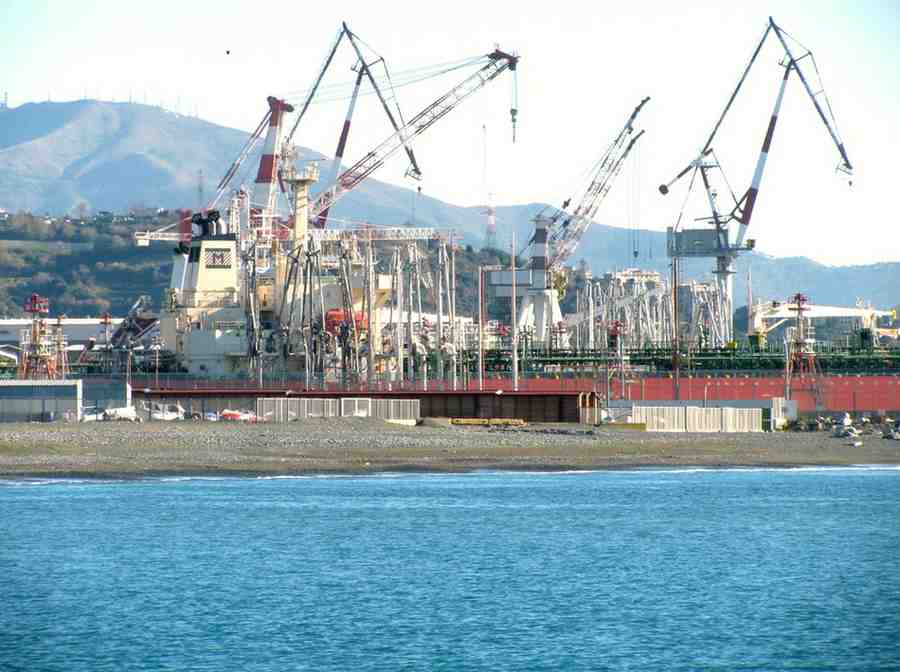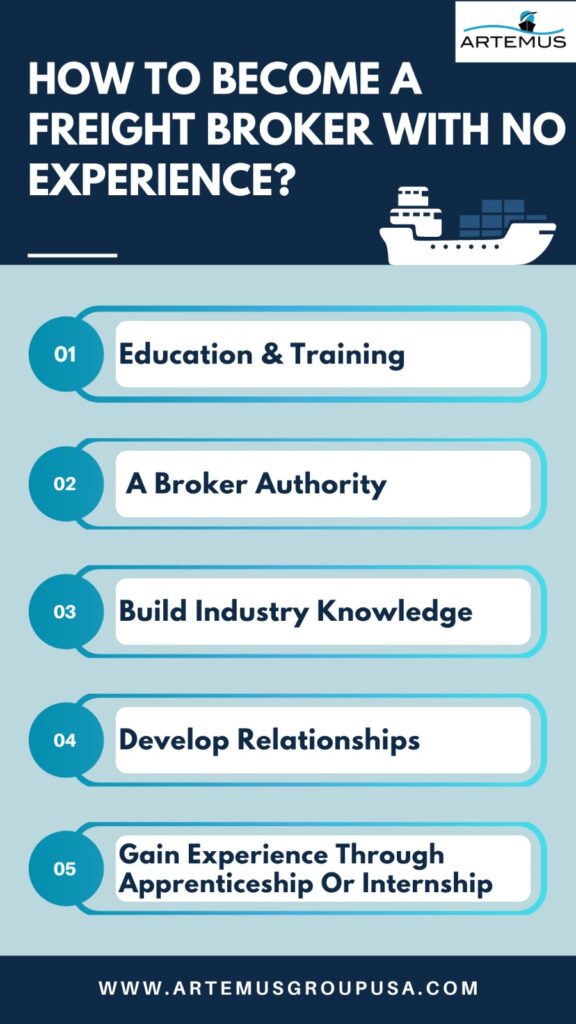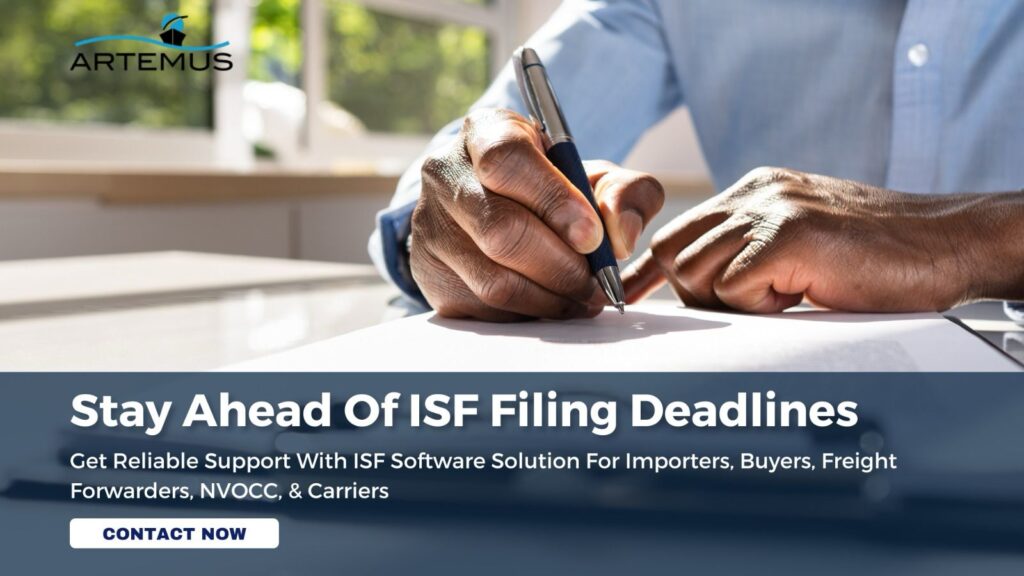
What Is Inbound Logistics & Outbound Logistics? A 2025 Guide
In the dynamic world of supply chain management, understanding the nuances of inbound and outbound logistics is crucial for operational

Entering the freight brokerage industry without prior experience may seem daunting, but it’s entirely feasible with the right approach. This guide will outline the steps needed to kickstart your career as a freight broker, even if you’re starting from scratch.
Additionally, Artemus Transportation Solutions provides ISF & AMS software solutions tailored for freight forwarders to ensure efficient compliance with regulations, streamlining customs clearance processes seamlessly.
Table Of Contents
A freight broker acts as an intermediary between shippers and carriers, facilitating the transportation of goods by connecting businesses in need of shipping services with trucking companies or other transportation providers.
They play a crucial role in the logistics industry by negotiating rates, arranging transportation, and ensuring the smooth movement of cargo from origin to destination. Freight brokers handle various tasks, including securing cargo space, managing paperwork, tracking shipments, and resolving any issues that may arise during transit.
They provide valuable services to both shippers and carriers, optimizing efficiency and helping businesses navigate the complexities of freight transportation.
Related: What Is Freight Forwarder Vs Broker: 6 Key Differences
Freight brokers play a vital role in the logistics industry by facilitating the movement of goods between shippers and carriers.
Related: What Is A Freight Broker & How Do They Work In 2024?
Introducing the key players in freight logistics, these entities collectively ensure the efficient movement of goods across supply chains:
These can range from manufacturers, distributors, wholesalers, and retailers to individuals shipping goods. Shippers are the originators of the freight and are responsible for packaging, labeling, and preparing goods for transportation.
Carriers are the transportation providers responsible for physically moving the freight. This category includes various modes of transport such as trucking companies, airlines, railroads, ocean freight carriers, and courier services. They transport goods from the point of origin to the destination specified by the shipper.
Acting as intermediaries between shippers and carriers, freight forwarders manage the entire transportation process. They handle documentation, customs clearance, and logistics coordination, ensuring that goods are transported efficiently and reach their destination on time.
Freight brokers facilitate transactions between shippers and carriers by connecting them and negotiating transportation rates. They play a pivotal role in matching the needs of shippers with the capabilities of carriers, optimizing efficiency and cost-effectiveness in freight transportation.
3PL providers offer comprehensive logistics solutions, including transportation, warehousing, inventory management, and distribution services. They act as outsourced logistics partners for businesses, handling various aspects of supply chain management to streamline operations and reduce costs.
Customs brokers specialize in customs clearance procedures, ensuring compliance with import and export regulations. They facilitate the smooth movement of goods across international borders by managing documentation, duties, taxes, and regulatory requirements, expediting the clearance process for shippers, and ensuring timely delivery of goods.
Related: How To Start A Freight Forwarding Business? 10 Easy Steps
Compliance with legal and regulatory requirements is essential in freight logistics to ensure smooth operations and avoid penalties. Here are five key points detailing these requirements:
Freight logistics involves the movement of goods across international borders, necessitating compliance with import and export regulations. These regulations vary by country and govern aspects such as documentation, customs duties, tariffs, and restricted or prohibited goods.
Various laws and regulations govern transportation activities, including those related to road safety, air transportation, maritime shipping, and rail transport. Compliance with these laws ensures the safety of goods in transit and adherence to industry standards.
Freight logistics operations may impact the environment through emissions, waste generation, and resource consumption. Compliance with environmental regulations involves measures to minimize environmental impact, such as using eco-friendly transportation modes, reducing fuel consumption, and proper waste management.
Ensuring the safety and security of goods during transportation is of utmost importance. Compliance with safety regulations involves measures to prevent accidents, secure cargo properly, and adhere to safety protocols. Security requirements focus on protecting goods from theft, tampering, and terrorism threats, often requiring security screenings, seals, and tracking systems.
Freight logistics providers may require various licenses and permits to operate legally. These may include transportation licenses, customs brokerage licenses, hazardous materials permits, and other industry-specific permits.
Obtaining and maintaining these licenses ensures compliance with regulatory authorities and demonstrates a commitment to operating within the legal framework.
Related: What Is Ocean Freight Forwarding & Its Process?

Becoming a freight broker with no prior experience can be challenging, but it’s not impossible. Here are five steps to kickstart your career in freight brokering:
Start by educating yourself about the freight brokerage industry through online courses, books, or seminars. Look for reputable training programs that offer comprehensive learning materials and certification options.
Apply for a freight broker authority from the Federal Motor Carrier Safety Administration (FMCSA) to legally operate as a freight broker. This involves completing the necessary paperwork, meeting financial responsibility requirements, and obtaining a surety bond or trust fund.
Familiarize yourself with industry terminology, regulations, and best practices by networking with experienced professionals, joining industry associations, and staying updated on industry news and trends.
Start building relationships with shippers and carriers by networking, attending industry events, and leveraging online platforms. Establishing trust and credibility with potential clients is crucial for securing business as a freight broker.
Consider gaining hands-on experience by working as an apprentice or intern for an established freight brokerage firm. This allows you to learn the ropes, gain practical skills, and build industry connections that can help jumpstart your career as a freight broker
Related: How To Choose A Freight Forwarder? 10 Critical Aspects
Successful freight brokers are distinguished by a unique blend of skills and qualities that empower them to thrive in the dynamic and demanding logistics industry. Here’s an in-depth exploration of the key attributes essential for excelling in the role:
Related: How To Become A Freight Forwarder: A Stepwise Guide
Growing a freight forwarding business requires strategic planning, proactive initiatives, and a commitment to delivering exceptional service. Here are eight key strategies to expand your freight forwarding business:
1. Expand Service Offerings: Diversify your service portfolio by offering additional freight forwarding services such as air freight, ocean freight, warehousing, customs brokerage, and supply chain management solutions, catering to a broader range of client needs.
2. Enhance Technology Integration: Invest in advanced freight management software and digital platforms to streamline operations, improve efficiency, and provide real-time tracking and visibility for clients, enhancing the overall customer experience.
3. Forge Strategic Partnerships: Establish strategic partnerships with carriers, suppliers, customs brokers, and other logistics providers to leverage their networks, capabilities, and resources, enabling you to offer comprehensive end-to-end solutions to clients.
4. Target New Markets: Identify and target new geographic markets or industry verticals with high demand for freight forwarding services. Conduct market research to understand client needs, competitive landscape, and regulatory requirements in target markets.
5. Focus On Customer Service: Prioritize exceptional customer service by offering personalized solutions, proactive communication, and responsive support throughout the shipment lifecycle, fostering long-term relationships and customer loyalty.
6. Optimise Operational Efficiency: Continuously assess and optimize operational processes, workflows, and resource allocation to maximise efficiency, minimise costs, and improve service quality, ensuring timely and reliable delivery of shipments.
7. Invest In Marketing & Branding: Develop a strong brand identity and marketing strategy to increase visibility, attract new clients, and differentiate your freight forwarding business in the marketplace. Utilize digital marketing channels, industry events, and networking opportunities to showcase your expertise and value proposition.
8. Embrace Innovation & Adaptation: Stay abreast of emerging trends, technological advancements, and regulatory changes in the freight forwarding industry. Embrace innovation, adapt to evolving market dynamics, and continuously seek opportunities for improvement and growth to remain competitive and resilient in a dynamic business environment.
Related: Freight Forwarder Software: Key Features & Solutions

Artemus specializes in providing cutting-edge ISF (Import Security Filing) and AMS (Automated Manifest System) software solutions tailored to streamline compliance processes for businesses operating in the import and export sectors.
With an unwavering commitment to innovation and efficiency, Artemus offers state-of-the-art technology designed to simplify complex regulatory requirements and enhance supply chain management.
By leveraging advanced algorithms and real-time data analysis, the software solutions enable businesses to achieve seamless compliance with ISF and AMS regulations, reducing the risk of penalties and delays while optimizing operational efficiency.
Related: What Does A Freight Forwarder Do? Functions & Future Trends
Yes, freight brokers have the potential to earn significant income through commissions on successful shipments.
Market yourself as a freight broker by networking with industry professionals, showcasing expertise through content creation, and offering exceptional customer service.
The profitability of a freight brokerage can vary widely, but successful ones can achieve profit margins ranging from 10% to 30%.

In conclusion, breaking into the freight brokerage industry without prior experience is indeed a daunting task, but it’s far from impossible. By leveraging the power of education, networking, and persistence, aspiring freight brokers can pave their way to success in this dynamic field.
Additionally, building strong relationships with shippers, carriers, and fellow professionals in the industry can open doors to valuable insights and opportunities.
Related: What Can I Do With A Customs Broker License? A 2024 Guide

In the dynamic world of supply chain management, understanding the nuances of inbound and outbound logistics is crucial for operational

In today’s interconnected world, businesses rely heavily on global trade to expand their markets, access new resources, and drive growth.

Importing goods for resale in the USA presents a lucrative business opportunity, but navigating the complexities of U.S. customs regulations,
Get In Touch
Artemus’ Software Solutions for ISF, AMS, Japan AFR, eManifest Canada, & Panama B2B filings.